Austrian actress Inge Egger (1923-1976) starred as the simple, modest and charming girl in dozens of West German entertainment films of the 1950s. She is best known as the singer of the all-girl band in the comedy Fanfaren der Liebe/Fanfares of Love (Kurt Hoffmann, 1951), which became the basis for Some Like It Hot (Billy Wilder, 1959). Only a few years later, illness, personal problems and negative media coverage caused Egger to retire from show business.
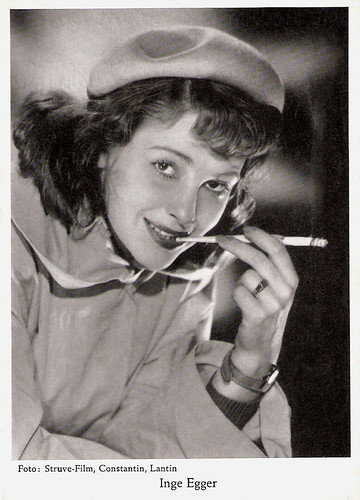
German collectors card. Photo: Struve-Film / Constantin / Lantin.
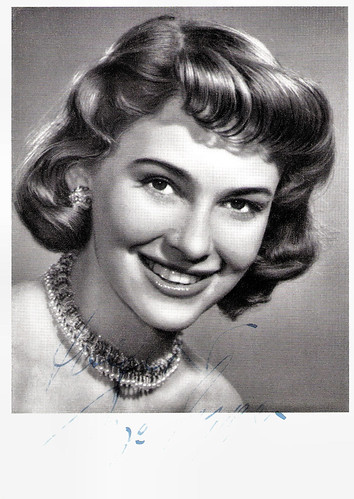
German autograph card.
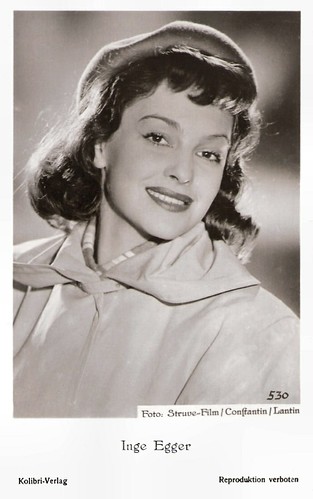
German postcard by Kolibri-Verlag, no. 530. Photo: Struwe-Film / Constantin / Lantin.
Ingeborg Gertrud Josefine Egger was born in Linz, Austria, in 1923, as the daughter of a merchant. She studied acting at the Max-Reinhardt Seminar in Vienna.
Her film debut was in the German-Austrian production Schrammeln (Géza von Bolváry, 1944). The film is about a 19th-century Vienna folk music quartet and stars Marte Harell, Hans Holt, Paul Hörbiger and Hans Moser.
After that, she signed a contract for six years with the Theater in der Josefstadt, where she acted in plays by Marcel Pagnol and Friedrich Schiller. In 1949, she went on an extensive tour through Germany with Paula Wessely in the drama The Lady from the Sea by Henrik Ibsen. A glandular disease caused her to be thick, so she could not work on screen for some years.
Her breakthrough in the cinema came with her leading role in the box office hit Fanfaren der Liebe/Fanfares of Love (Kurt Hoffmann, 1951). In this comedy, Dieter Borsche and Georg Thomalla co-starred as two desperate out-of-work musicians who join in drag the Alpine Violets, an all-girl orchestra. The lovely and fresh Egger is the singer of the band.
Timothy Damon at IMDb: "Billy Wilder may have said that he only used the premise of this film and one scene in Some Like It Hot, but aside from the absence of gangsters in the original and women who seem to catch on a lot quicker to what's going on, I didn't see many dissimilarities." Next, Egger and Dieter Borsche also co-starred in Sündige Grenze/Illegal Border (Robert A. Stemmle, 1951), a socio-critical drama about smugglers.
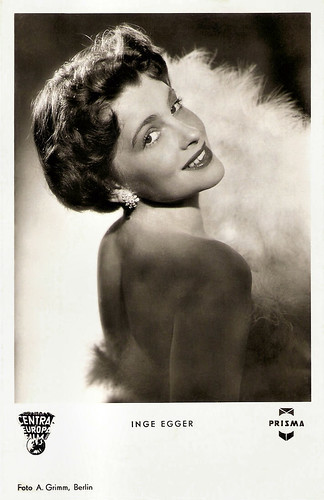
German postcard by Kunst und Bild, Berlin, no. A 804. Photo: Central-Europa / Prisma / A. Grimm. Publicity still for Die Rose von Stambul/The Rose of Stambul (Karl Anton, 1953).
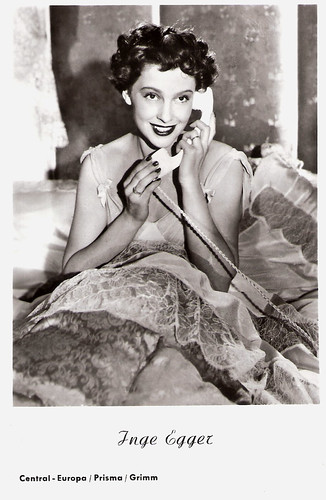
German postcard by Schneider Junior, Neunkirchen/Saar, no. 12. Photo: Central-Europa / Prisma / Grimm. Publicity still for Die Rose von Stambul/The Rose of Stambul (Karl Anton, 1953).
In the following years, Inge Egger played leads in more than 20 films, including the musical Die Rose von Stambul/The Rose of Stamboul (Karl Anton, 1953) with Albert Lieven, the sequel Fanfaren der Ehe/Fanfares of Marriage (Hans Grimm, 1953) again opposite Dieter Borsche and Georg Thomalla, and the drama Die Toteninsel/Isle of the Dead (Viktor Tourjansky, 1955) opposite Willy Birgel.
In the comedy Der Mustergatte/The Model Husband (Erik Ode, 1956), she appeared opposite Harald Juhnke and Theo Lingen. It was a remake of Der Mustergatte/The Model Husband (Wolfgang Liebeneiner, 1937) with Heinz Rühmann, which was itself based on the American play Fair and Warmer by Avery Hopwood.
Egger also starred in musical comedies like Ein Mann muß nicht immer schön sein/A Man Doesn't Always Need to Be Handsome (Hans Quest, 1956) with Peter Alexander and Der Fremdenführer von Lissabon/The guide of Lisbon (Hans Deppe, 1956) starring Vico Torriani. However, illness, personal problems and negative media coverage caused her to retire from the film business. Egger went to Berlin in 1956 and there she appeared in stage roles.
In the cinema, she later played only a few supporting parts, such as in the comedy-drama Das kunstseidene Mädchen/The High Life (Julien Duvivier, 1960) featuring Giulietta Masina, and the satire Wir Kellerkinder/We Cellar Children (Hans-Joachim Wiedermann, 1960) starring Wolfgang Neuss and Karin Baal.
From 1960 to 1973 she worked as a medical technician at the Berliner Bundesgesundheitsamt (the Berlin Federal Health Office). Soon the public forgot her. In 1976, Inge Egger died of cancer in Berlin. She was only 53.
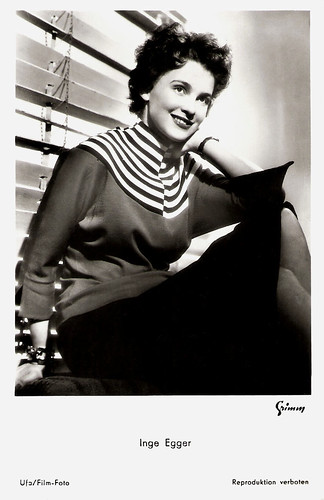
German postcard by Ufa, Berlin-Tempelhof, no. FK 872. Photo: Grimm.
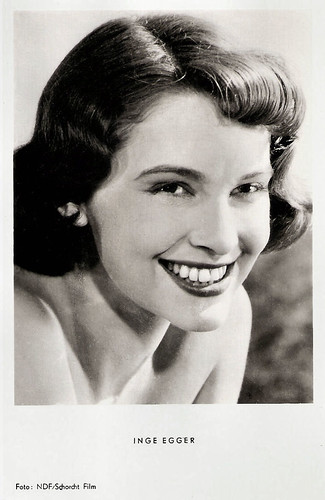
German postcard by Kunst und Bild, Berlin, no. H 477. Photo: NDF / Schorcht Film.
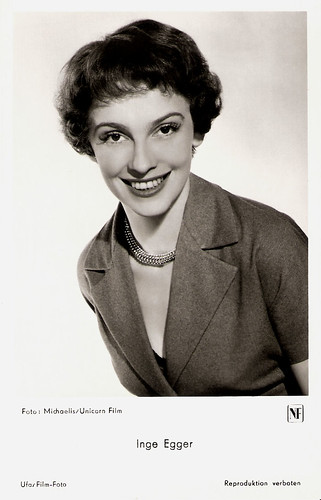
German postcard by Ufa, Berlin-Tempelhof, no. FK 2088. Photo: Michaelis / Unicorn Film / NF.
Sources: Stephanie D’heil (Steffi-line – German), Rudi Polt (Find A Grave), Wikipedia (German and English), and IMDb.
This post was last updated on 9 February 2024.

German collectors card. Photo: Struve-Film / Constantin / Lantin.

German autograph card.

German postcard by Kolibri-Verlag, no. 530. Photo: Struwe-Film / Constantin / Lantin.
The Alpine Violets
Ingeborg Gertrud Josefine Egger was born in Linz, Austria, in 1923, as the daughter of a merchant. She studied acting at the Max-Reinhardt Seminar in Vienna.
Her film debut was in the German-Austrian production Schrammeln (Géza von Bolváry, 1944). The film is about a 19th-century Vienna folk music quartet and stars Marte Harell, Hans Holt, Paul Hörbiger and Hans Moser.
After that, she signed a contract for six years with the Theater in der Josefstadt, where she acted in plays by Marcel Pagnol and Friedrich Schiller. In 1949, she went on an extensive tour through Germany with Paula Wessely in the drama The Lady from the Sea by Henrik Ibsen. A glandular disease caused her to be thick, so she could not work on screen for some years.
Her breakthrough in the cinema came with her leading role in the box office hit Fanfaren der Liebe/Fanfares of Love (Kurt Hoffmann, 1951). In this comedy, Dieter Borsche and Georg Thomalla co-starred as two desperate out-of-work musicians who join in drag the Alpine Violets, an all-girl orchestra. The lovely and fresh Egger is the singer of the band.
Timothy Damon at IMDb: "Billy Wilder may have said that he only used the premise of this film and one scene in Some Like It Hot, but aside from the absence of gangsters in the original and women who seem to catch on a lot quicker to what's going on, I didn't see many dissimilarities." Next, Egger and Dieter Borsche also co-starred in Sündige Grenze/Illegal Border (Robert A. Stemmle, 1951), a socio-critical drama about smugglers.

German postcard by Kunst und Bild, Berlin, no. A 804. Photo: Central-Europa / Prisma / A. Grimm. Publicity still for Die Rose von Stambul/The Rose of Stambul (Karl Anton, 1953).

German postcard by Schneider Junior, Neunkirchen/Saar, no. 12. Photo: Central-Europa / Prisma / Grimm. Publicity still for Die Rose von Stambul/The Rose of Stambul (Karl Anton, 1953).
Illness, personal problems and negative media coverage
In the following years, Inge Egger played leads in more than 20 films, including the musical Die Rose von Stambul/The Rose of Stamboul (Karl Anton, 1953) with Albert Lieven, the sequel Fanfaren der Ehe/Fanfares of Marriage (Hans Grimm, 1953) again opposite Dieter Borsche and Georg Thomalla, and the drama Die Toteninsel/Isle of the Dead (Viktor Tourjansky, 1955) opposite Willy Birgel.
In the comedy Der Mustergatte/The Model Husband (Erik Ode, 1956), she appeared opposite Harald Juhnke and Theo Lingen. It was a remake of Der Mustergatte/The Model Husband (Wolfgang Liebeneiner, 1937) with Heinz Rühmann, which was itself based on the American play Fair and Warmer by Avery Hopwood.
Egger also starred in musical comedies like Ein Mann muß nicht immer schön sein/A Man Doesn't Always Need to Be Handsome (Hans Quest, 1956) with Peter Alexander and Der Fremdenführer von Lissabon/The guide of Lisbon (Hans Deppe, 1956) starring Vico Torriani. However, illness, personal problems and negative media coverage caused her to retire from the film business. Egger went to Berlin in 1956 and there she appeared in stage roles.
In the cinema, she later played only a few supporting parts, such as in the comedy-drama Das kunstseidene Mädchen/The High Life (Julien Duvivier, 1960) featuring Giulietta Masina, and the satire Wir Kellerkinder/We Cellar Children (Hans-Joachim Wiedermann, 1960) starring Wolfgang Neuss and Karin Baal.
From 1960 to 1973 she worked as a medical technician at the Berliner Bundesgesundheitsamt (the Berlin Federal Health Office). Soon the public forgot her. In 1976, Inge Egger died of cancer in Berlin. She was only 53.

German postcard by Ufa, Berlin-Tempelhof, no. FK 872. Photo: Grimm.

German postcard by Kunst und Bild, Berlin, no. H 477. Photo: NDF / Schorcht Film.

German postcard by Ufa, Berlin-Tempelhof, no. FK 2088. Photo: Michaelis / Unicorn Film / NF.
Sources: Stephanie D’heil (Steffi-line – German), Rudi Polt (Find A Grave), Wikipedia (German and English), and IMDb.
This post was last updated on 9 February 2024.
No comments:
Post a Comment